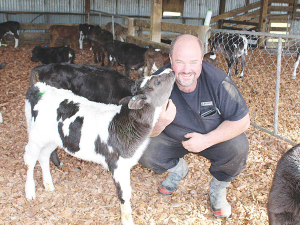Waituna Lagoon consent puts farms at risk, Federated Farmers Say
According to Federated Farmers, Environment Southland has mishandled the consent process for Waituna Lagoon, leaving the community with numerous bad outcomes.
 Jason Herrick, Feds Southland, says the only thing these unworkable rules do is punish the good farmers doing a great job out there.
Jason Herrick, Feds Southland, says the only thing these unworkable rules do is punish the good farmers doing a great job out there.
Southland farmers aren't surprised by research showing that a new national freshwater policy opposes their perception of a good farmer and good farming practices.
The National Policy Statement for Freshwater Management was implemented in September 2020 and received a negative reaction from the farming community as it did not suit the diversity of all farms across different parts of the country.
It was deemed especially unworkable in colder parts of the country and on topographically diverse sheep and beef farms.
Lead author Professor Sara Walton, University of Otago department of management, says this led researchers to interview nine farmers from arount Otago in late 2021 and early 2022 about how they saw their role in relation to shifting societal expectatons around environment goals in farming.
Researchers aimed to explore the conflicts between being a good farmer and complying with the policy, and the potential unintended consequences of the policy on rural communities.
"Farmers mentioned factors such as understanding their farm environment, conservative management of resources and giving back to the communities in their definition of good farmers," Walton says.
"They also noted tensions between the impacts of the new freshwater regulations on farm practices and their identity as a good farmer."
Southland Federated Farmers winter grazing spokesperson and junior vice president, Jason Herrick, says the research findings don't surprise him.
Herrick told Dairy News that it shows in the change in approach to wintering with a massive shift to grazing pasture and baleage over conventional winter crops.
He says the only thing "these unworkable rules" do is punish the good farmers doing a great job out there.
"The rules and blanket implementation of freshwater farm plans are only doing the same and a lot of farmers are only doing the same and a lot of farmers that are doing awesome things are now looking at getting out of farming because of the amount of regulation and ridiculous costs attached, that has no benefit to the environment around us.
"In my opinion it's almost what central government and the bureaucrats want, as it replaces the genuine family farmer with corporate organisations. Corporates are easier to control and conform."
The new regulations include mandatory fencing and destocking of all freshwater bodies, restrictions on the location and duration of winter forage crops, and caps on nitrogenous fertiliser use.
The University of Otago research results, published in Agriculture and Human Values, show Otago farmers dislike the blanket rules that apply to all farms and would prefer a more targeted approach with relevant farmers in problem areas.
"The one-size-fits-all nature of the policy has the potential to create counterproductive outcomes to the founding concept of Te Mana o Te Wai, which recognises the importance of freshwater health," Walton says.
Co-author, Associate Professor Janice Lord of the Department of Botany, says there is discontent around the regulations and a perceived lack of appreciation by policy makers of the challenges of farming in some parts of the country.
"The new rules have a real chance of producing some negative results by effectively regulating farmers into a corner and not taking localised factors into account," she says.
This could include:
Walton says being a good farmer was an important part of farmers' identity and had been for many years.
The concept has moved away from being purely economic and instead conveys a set of shared social norms and understandings.
"Complying with the changing regulations was found to be a tension in their desire to remain being seen as a good farmer."
Recent weather events in the Bay of Plenty, Gisborne/Tairawhiti, and Canterbury have been declared a medium-scale adverse event.
DairyNZ's chief executive Campbell Parker says the 2024/25 dairy season reinforces the importance of the dairy sector to New Zealand.
A New Zealand agribusiness helping to turn a long-standing animal welfare and waste issue into a high-value protein stream has won the Australian dairy sector's top innovator award.
OPINION: A bumper season all around.
Dairy Women's Network (DWN) has announced that Taranaki dairy farmer Nicola Bryant will join its Trust Board as an Associate Trustee.
Rural Women New Zealand (RWNZ) says it welcomes the release of a new report into pay equity.
OPINION: Staying with politics, with less than nine months to go before the general elections, there’s confusion in the Labour…
OPINION: Winston Peters' tirade against the free trade deal stitched with India may not be all political posturing by the…